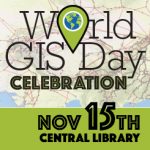On Wednesday, November 15, the Jean and Alexander Heard Libraries will be celebrating World GIS Day with a lively and thought-provoking workshop, talk, and reception hosted in the Central Library. The schedule of events is below – for more information, please contact Lindsey Fox (Lindsey.Fox@vanderbilt.edu).GIS Day – November 15, 2017
Introduction to GeoJSON and GeoJSON-T (Workshop)
Who: Karl Grossner
When: 10-11 AM
Where: Central Library 418a
Linking Pasts with Historical Gazetteers (Lecture)
Who: Karl Grossner
When: 2-3 PM
Where: Central Library Community Room
GIS Day Reception (Refreshments and Lively Conversation)
Who: Anybody interested in GIS!
When: 3 PM
Where: Central Library Community Room
Our speaker is Karl Grossner. Karl is an independent GIScience researcher working to develop novel models, standard formats, and semantically-enabled software and systems supporting the emerging genre of digital historical atlases. A co-founder of the GeoHumanities SIG within the Alliance for Digital Humanities Organizations (2013), he is an active member of that global and trans-disciplinary community. After earning a Ph.D. in Geography at U.C. Santa Barbara in 2010, Karl worked for five years as a digital humanities research developer at Stanford University, where he built several significant interactive scholarly web applications in partnership with faculty members. Now based in Denver, he is serving as Technical Director of the World-Historical Gazetteerproject at the University of Pittsburgh. His related research efforts include GeoJSON-T, a temporal extension to the GeoJSON data standard, and Linked Places, experimental web software for representing, sharing, and analyzing data about historical geographic routes and movement.
Linking Pasts with Historical Gazetteers
The “spatial turn” within the social sciences, stimulated in the 1990s by the advent of geographic information systems, has increasingly spread to many fields in the humanities. In order to explore geospatial questions in their research, historians, literary scholars, archaeologists, and philologists are encoding place references found in the historical texts, maps, and tabular records that comprise their sources. In order for spatial patterns to be discovered and visualized in maps, or analyzed in specialized spatial software, those tagged places must be georeferenced—associated with one or more physical locations specified by geographic coordinates or topology. For modern source documents, this set of tasks has become fairly routine, but historical sources present distinctive challenges: place names and administrative boundaries change continually, and within any given time period, names can have numerous language and spelling variants; uncertainty in many forms is endemic.
In this talk, Karl will describe how a global community of historical scholars is collectively meeting those challenges, and leveraging Linked Open Data publication practice to connect and share the historical gazetteer datasets produced in the course of their research. Karl will also introduce the World-Historical Gazetteer, a three-year project just under way at the University of Pittsburgh’s World History Center that will become a significant node in the emerging web of historical gazetteers (http://whgazetteer.org).
